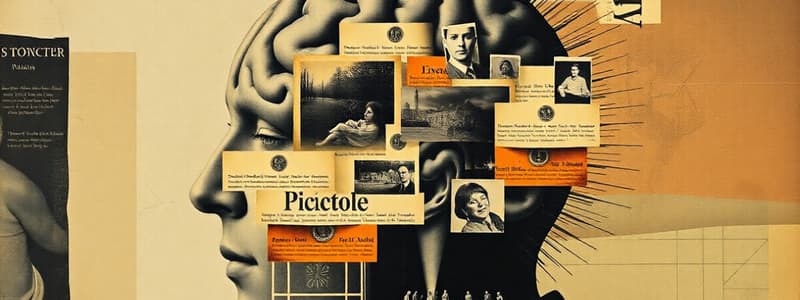Podcast
Questions and Answers
What is the most accurate and complete understanding of willpower?
What is the most accurate and complete understanding of willpower?
- A combination of the ability to initiate actions, resist impulses, and focus on long-term goals. (correct)
- The ability to resist temptations and say 'no' to immediate desires.
- The mental strength to force oneself to complete unpleasant tasks.
- The inherent characteristic that some people possess more of than others.
If someone is continually struggling with self-control, what might be a useful first step based on the concepts presented?
If someone is continually struggling with self-control, what might be a useful first step based on the concepts presented?
- Seeking professional help for an underlying mental health condition.
- Identifying the conflicting desires between their impulsive and wiser selves. (correct)
- Implementing stricter rules for themselves.
- Increasing physical exercise to boost energy levels.
When someone exerts considerable willpower in one task and then struggles to maintain self-control in a subsequent, unrelated situation, what is this phenomenon called?
When someone exerts considerable willpower in one task and then struggles to maintain self-control in a subsequent, unrelated situation, what is this phenomenon called?
- Goal contagion
- Ego depletion (correct)
- Counteractive control
- Moral licensing
According to research, what physiological change is associated with being in a state conducive to self-control?
According to research, what physiological change is associated with being in a state conducive to self-control?
What role does dopamine play in the brain's reward system?
What role does dopamine play in the brain's reward system?
What is mindful indulgence, and how can it help with self-control?
What is mindful indulgence, and how can it help with self-control?
Someone experiencing the 'what the hell' effect after a minor diet slip-up might think:
Someone experiencing the 'what the hell' effect after a minor diet slip-up might think:
What is the most effective way to overcome the 'what the hell' effect?
What is the most effective way to overcome the 'what the hell' effect?
The concept of 'goal contagion' suggests that:
The concept of 'goal contagion' suggests that:
If you notice a friend frequently giving in to unhealthy temptations, and you find yourself more tempted as a result, what concept is at play?
If you notice a friend frequently giving in to unhealthy temptations, and you find yourself more tempted as a result, what concept is at play?
What is 'moral licensing', and how can it be detrimental to achieving long-term goals?
What is 'moral licensing', and how can it be detrimental to achieving long-term goals?
According to research, what is the relationship between thinking about doing something good and moral licensing?
According to research, what is the relationship between thinking about doing something good and moral licensing?
What is the primary reason why people tend to 'discount' future rewards?
What is the primary reason why people tend to 'discount' future rewards?
What is a 'precommitment' strategy, and how does it aid self-control?
What is a 'precommitment' strategy, and how does it aid self-control?
What is ironic rebound in the context of thought suppression?
What is ironic rebound in the context of thought suppression?
According to research, what is a more effective approach than thought suppression for managing unwanted thoughts and cravings?
According to research, what is a more effective approach than thought suppression for managing unwanted thoughts and cravings?
Instead of viewing willpower challenges as personal failings, a 'willpower scientist' would:
Instead of viewing willpower challenges as personal failings, a 'willpower scientist' would:
What is willpower?
What is willpower?
How does the 'pause and plan' response relate to self-control?
How does the 'pause and plan' response relate to self-control?
What is the relationship between glucose and willpower, according to the 'energy budget model'?
What is the relationship between glucose and willpower, according to the 'energy budget model'?
According to available information, what accurately describes how marketing leverages the brain's reward system:
According to available information, what accurately describes how marketing leverages the brain's reward system:
What is the key difference between how dopamine affects us and how that relates to happiness?
What is the key difference between how dopamine affects us and how that relates to happiness?
According to the information provided, what is a potential outcome of self-criticism when trying to improve behavior?
According to the information provided, what is a potential outcome of self-criticism when trying to improve behavior?
What is a reason that a buddy system helps to improve will power?
What is a reason that a buddy system helps to improve will power?
Saying certain items are, 'fat-free', 'organic', and/or offering a discount, can cause us to overindulge. What effect is being used in these situations?
Saying certain items are, 'fat-free', 'organic', and/or offering a discount, can cause us to overindulge. What effect is being used in these situations?
For a person to stick to change, what do they need to identify with?
For a person to stick to change, what do they need to identify with?
What is a way to reduce the power of temptations?
What is a way to reduce the power of temptations?
What can an overly optimistic view of one's future self lead to?
What can an overly optimistic view of one's future self lead to?
What is hyperopia?
What is hyperopia?
When you try not to think about something it stays fresh in your mind because:
When you try not to think about something it stays fresh in your mind because:
What mindset should individuals adopt to test strategies and improve personal willpower?
What mindset should individuals adopt to test strategies and improve personal willpower?
What is the key to breaking cycles of wanting
What is the key to breaking cycles of wanting
What is the most effective way to improve will power?
What is the most effective way to improve will power?
According to the information provided, what should you do after experiencing lapse in willpower:
According to the information provided, what should you do after experiencing lapse in willpower:
What causes humans to procrastinate?
What causes humans to procrastinate?
How does the brain's response differ when in a state of stress versus a state conducive to self-control?
How does the brain's response differ when in a state of stress versus a state conducive to self-control?
What is the relationship between dopamine and happiness in the brain's reward system?
What is the relationship between dopamine and happiness in the brain's reward system?
How can 'mindful indulgence' assist with self-control?
How can 'mindful indulgence' assist with self-control?
What is the most effective way to counteract the 'what the hell' effect following a minor setback?
What is the most effective way to counteract the 'what the hell' effect following a minor setback?
How can social norms either undermine or support individual willpower goals?
How can social norms either undermine or support individual willpower goals?
What is the key difference between focusing on 'commitment to goals and values' versus focusing on the 'halo glow' of being good when trying to overcome moral licensing?
What is the key difference between focusing on 'commitment to goals and values' versus focusing on the 'halo glow' of being good when trying to overcome moral licensing?
How does creating distance from immediate temptations aid in self-control?
How does creating distance from immediate temptations aid in self-control?
What is the 'ironic rebound' effect in thought suppression, and what is a more effective strategy?
What is the 'ironic rebound' effect in thought suppression, and what is a more effective strategy?
How could a person utilize precommitment to improve their willpower when trying to eat healthier?
How could a person utilize precommitment to improve their willpower when trying to eat healthier?
Why is it important to foster a connection with one's future self to improve willpower?
Why is it important to foster a connection with one's future self to improve willpower?
Flashcards
Willpower Components
Willpower Components
Encompasses 'I will' (initiate tasks), 'I won't' (resist impulses), and 'I want' (focus on long-term goals).
Impulsive vs. Wiser Self
Impulsive vs. Wiser Self
Recognizing the conflict between impulsive desires and long-term goals.
Pause and Plan Response
Pause and Plan Response
The body's state when using self-control, opposite of 'fight or flight'.
Heart Rate Variability (HRV)
Heart Rate Variability (HRV)
Signup and view all the flashcards
Ego Depletion
Ego Depletion
Signup and view all the flashcards
Energy Budget Model
Energy Budget Model
Signup and view all the flashcards
Dopamine
Dopamine
Signup and view all the flashcards
What the Hell Effect
What the Hell Effect
Signup and view all the flashcards
Social Contagion of Willpower
Social Contagion of Willpower
Signup and view all the flashcards
Goal Contagion
Goal Contagion
Signup and view all the flashcards
Moral Licensing
Moral Licensing
Signup and view all the flashcards
Optimism Bias
Optimism Bias
Signup and view all the flashcards
Present Bias
Present Bias
Signup and view all the flashcards
Precommitment Strategies
Precommitment Strategies
Signup and view all the flashcards
Thought Suppression Paradox
Thought Suppression Paradox
Signup and view all the flashcards
Thought Acceptance
Thought Acceptance
Signup and view all the flashcards
Willpower Scientist Mindset
Willpower Scientist Mindset
Signup and view all the flashcards
"I Will" Power
"I Will" Power
Signup and view all the flashcards
"I Won't" Power
"I Won't" Power
Signup and view all the flashcards
"I Want" Power
"I Want" Power
Signup and view all the flashcards
Limited Resource
Limited Resource
Signup and view all the flashcards
"Fight or Flight" Response
"Fight or Flight" Response
Signup and view all the flashcards
Feeling of Entitlement
Feeling of Entitlement
Signup and view all the flashcards
Reward Stimuli
Reward Stimuli
Signup and view all the flashcards
Snowballing Lapses
Snowballing Lapses
Signup and view all the flashcards
Unrealistic Hope
Unrealistic Hope
Signup and view all the flashcards
Mirror Effect
Mirror Effect
Signup and view all the flashcards
Study Notes
Defining Willpower and Its Components
- Willpower involves not only resisting temptation ("I won't power") but also initiating necessary actions ("I will power") and focusing on long-term goals ("I want power").
- These three components of willpower work together to help achieve goals and avoid negative outcomes.
- The prefrontal cortex development which governs willpower capacities is a defining human trait.
- Every willpower challenge involves a conflict between the impulsive self (immediate gratification) and the wiser self (long-term goals).
Biological Basis and Limitations of Willpower
- Self-control has a physiological basis; exerting willpower induces a "pause and plan" response, not a "fight or flight" response.
- The "pause and plan" response involves a slowed heart rate and increased heart rate variability (HRV), indicating a balance between the nervous systems.
- Higher HRV is associated with greater self-control capacity.
- Willpower is a limited resource that can be depleted with use ("ego depletion").
- Engaging in one act of self-control can temporarily reduce the capacity for self-control in other areas.
- Brain energy (glucose) affects willpower, and low blood sugar can weaken self-control.
- The brain may become "stingy" with limited energy, prioritizing essential functions over self-control.
- Willpower can be strengthened through consistent "workouts" involving small, regular acts of self-control.
Brain's Reward System and the Illusion of Happiness
- The brain's reward system, centered around dopamine, creates desire and motivates action by promising pleasure.
- Dopamine creates desire rather than sustained happiness.
- The reward system can be triggered by novelty, variety, price tricks, and sensory cues.
- The reward system can create wanting and stress; anticipation of reward is often accompanied by anxiety, if not obtained.
- The pursuit of fleeting pleasures can occur if promised reward is mistaken for actual happiness.
- Mindful indulgence, or giving into temptation whilst paying attention, can reveal the gap between the promised reward and the actual satisfaction.
The "What the Hell" Effect and Self-Forgiveness
- The "what the hell effect" involves a minor lapse in self-control leading to guilt, which triggers further overindulgence.
- Self-criticism after a setback can exacerbate this destructive cycle.
- Self-forgiveness is a more effective strategy than guilt for supporting self-control after a lapse.
- Acknowledging that everyone slips up can prevent a small mistake from escalating into a major relapse.
Contagious Nature of Willpower and Temptation
- Behaviors, including fitness and self-control, can be "contagious" within social groups.
- "Goal contagion" describes observing others pursuing a goal which can activate that same goal in oneself.
- "Counteractive control" is where witnessing someone else give in to temptation can strengthen one's own commitment to a conflicting goal.
- Social norms and "social proof" (if others are doing it, it must be okay) can impact individual choices, undermining willpower.
- Imagining others' evaluations (pride or disapproval) can be a motivator for self-control.
- Accountability to others and a "buddy system" can provide external support for willpower challenges.
Moral Licensing: The Permission to Be Bad
- "Moral licensing" is engaging in good behavior which can create a feeling of having "earned" the right to indulge in less virtuous behavior.
- This licensing does not need a logical connection between the good deed and indulgence.
- Optimism about future good behavior can also lead to indulgence in the present, with the belief that one can "make up for it" later.
- The "halo effect" is where a virtuous aspect of a temptation creates a positive perception that overshadows its negative consequences, licensing indulgence.
- To overcome moral licensing, focus on commitment to goals and values ("remember the why") rather than viewing willpower challenges as measures of moral worth.
Present vs. Future Selves
- Humans "discount" future rewards, making immediate gratification more appealing even if it undermines long-term goals.
- Creating distance (physical or temporal) from immediate temptations can reduce their power.
- "Precommitment" strategies involve making choices in advance to prevent the future tempted self from derailing goals.
- Individuals often have an overly optimistic view of their "future selves", leading to procrastination.
- It's important to foster a connection with one's future self to make long-term consequences feel more real and motivating.
- Some individuals suffer from "hyperopia" (extreme far-sightedness), excessively delaying pleasure leading to regret and unhappiness.
Paradox of Thought Suppression
- Trying to suppress thoughts, cravings, or impulses can paradoxically make them stronger ("ironic rebound").
- The brain's "monitor" constantly scans for forbidden content, keeping it top of mind.
- The more one tries to push a thought away, the more likely one is to believe it has significance or truth.
- A more effective approach is to accept the presence of unwanted thoughts and feelings without engaging with them.
Embracing a Scientific Approach to Willpower
- Adopting a "willpower scientist" mindset, treating one's own life as an experiment, is helpful.
- Self-awareness and observing one's own patterns of temptation, procrastination, and rationalization are crucial.
- Willpower struggles are presented as universal human experiences, not individual failings.
Willpower: Importance
- Willpower is important in daily life because it enables us to navigate complexities, make choices aligned with well-being, and manage conflicts between gratification and long-term benefits.
- It underpins the ability to maintain healthy habits, achieve goals, and resist detrimental impulses.
Willpower as a Muscle
- Willpower is a limited resource that can become depleted through use, like a muscle.
- Engaging in acts of self-control draws from a finite pool of mental energy.
- Exhaustion of this resource makes one vulnerable to impulses.
Stress and Willpower
- Stress undermines willpower by shifting bodies into "fight or flight," prioritizing immediate survival over long-term goals.
- Stress increases heart rate and decreases heart rate variability (HRV).
- A state conducive to self-control activates the "pause and plan" response, marked by a slower heart rate and increased HRV.
Moral Licensing Explained
- Moral licensing is where behaving virtuously makes one feel entitled to indulge in less desirable behaviors.
- A past "good deed" can create a mental justification for a subsequent "bad" one.
- This can lead to losing sight of overall goals and giving in to temptation.
Brain's Reward System
- The brain's reward system releases dopamine when anticipating pleasure, motivating action and consumption.
- A dopamine rush does not equate to happiness but rather a feeling of arousal and wanting.
- The pursuit of reward is not always aligned with happiness.
- Mistaking the "promise of reward" for actual happiness leads to cycles of wanting and dissatisfaction.
The "What the Hell" Effect: Explained
- The "what the hell" effect describes where an initial lapse in self-control can trigger further indulgence to cope with negative emotions.
- Practice self-forgiveness rather than self-criticism after a setback.
- Focus on recommitting to goals rather than dwelling on the mistake is key to minimizing damage.
Thinking About Future Selves
- People have a distorted view of their future selves, tending to be overly optimistic about their willpower and willingness to delay gratification.
- Be aware of the future self perspective to improve willpower.
Strengthening Willpower
- Willpower is influenced by those around, therefore be aware of who one is mirroring.
- Attempts to suppress unwanted thoughts can lead to "ironic rebound."
- Practice acceptance of thoughts without judgment, focus on the present, to manage cravings and distractions.
- Recognize moral licensing and the allure of immediate rewards over delayed gratification to make conscious choices.
Studying That Suits You
Use AI to generate personalized quizzes and flashcards to suit your learning preferences.





